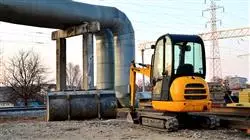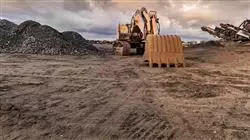University certificate
The world's largest faculty of engineering”
Why study at TECH?
Become a prestigious engineer, capable of carrying out optimal Project Management work with this Postgraduate diploma offered by TECH”

In this Postgraduate diploma, special emphasis will be placed on the Project Manager's management of key aspects of project development such as scope management and schedule management. The importance of controlling and managing the scope of the project in compliance with all the stages established by the main international entities recognized in project management will be analyzed.
Regarding the schedule, a precise analysis will be made of the entire process of creating and controlling the schedule, as well as its subsequent follow-up. In this sense, important terms such as baseline, critical path, acceleration plan or recovery plan will be discussed in depth.
Thus, by studying this Postgraduate diploma, the professional will be able to control the management of the schedule in all its phases, acquiring the necessary skills to make relevant decisions for the development of the project in time and form.
In addition, we will thoroughly address the project manager's management of key aspects of project development, such as purchasing management and project resource management.
The importance of purchasing control and management will be analyzed, as well as the benefits for the project of carrying out a good purchasing cycle. On the other hand, the resources in the project will be studied, as well as the importance of optimizing them to the maximum.
Know the role of the project manager's approach in one of the key aspects to be taken into account such as cost control. Important points to be taken into account will be discussed in detail, such as: project margin, cash flow, earned value and earned term. We will also teach the necessary steps to carry out an adequate project cost control in order to make the project self-financing.
All this, throughout a 100% online training that provides the student with the ease of being able to take it wherever and whenever they want. You will only need a device with internet access, and you will be able to access a universe of knowledge that will be the main basis for engineers to position themselves in a sector that is increasingly demanded by companies in various sectors.
You will have access to not only the best didactic material, but also the best teaching staff on the international scene"
This Postgraduate diploma in Construction Project Management contains the most complete and up to date educational program on the market. The most important features of the program include:
- Practical cases presented by experts in Civil Engineering and Geotechnics
- The graphic, schematic, and eminently practical contents with which they are created, provide scientific and practical information on the disciplines that are essential for professional practice
- Practical exercises where self-assessment can be used to improve learning
- Special emphasis on innovative methodologies
- Theoretical lessons, questions to the expert, debate forums on controversial topics, and individual reflection assignments
- Content that is accessible from any fixed or portable device with an Internet connection
Study wherever and whenever you want, establishing your own schedule and objectives. The academic flexibility that TECH offers is unique on the market”
The program’s teaching staff includes professionals from the sector who contribute their work experience to this specialization program, as well as renowned specialists from leading societies and prestigious universities.
The multimedia content, developed with the latest educational technology, will provide the professional with situated and contextual learning, i.e., a simulated environment that will provide immersive training programmed to train in real situations.
This program is designed around Problem Based Learning, whereby the professional must try to solve the different professional practice situations that arise during the academic year. For this purpose, the professional will be assisted by an innovative interactive video system created by renowned and experienced engineering experts.
The skills you will acquire will enable you to manage EPC projects and position yourself as a prestigious professional"

This 100% online program will allow you to combine your studies with your professional work. You choose where and when to train"
Syllabus
The syllabus has been built based on the intensive and high-impact specialization requirements of this Postgraduate diploma. Through a complete course, which incorporates all the key aspects in order to carry out the successful Construction Project Management, the student will develop their theoretical and practical knowledge, achieving a professional and personal growth that will allow them to intervene in this field of work with confidence. You will achieve this through top-notch content designed by the best professionals in the industry.

By studying here you will have access to the most complete and up-to-date library of contents on the market”
Module 1. Project Management: Scope and Schedule Management
1.1. Scope Control
1.1.1. Scope of the Project
1.1.2. Base Line of the Scope of the Project
1.1.3. The Importance of the Control Account
1.2. Requirement Management
1.2.1. Requirement Management
1.2.2. Categories
1.2.3. Management Process
1.3. Scope Management
1.3.1. Scope Management Planning
1.3.2. Gather Requirements
1.3.3. Particularities of the Scope
1.4. Study of the Scope
1.4.1. Creating the WBS
1.4.2. Validation of the Scope
1.4.3. Scope Control
1.5. Schedule Control
1.5.1. Project Schedule
1.5.2. Base Line of the Schedule
1.5.3. Analysis of the Critical Route
1.6. Creating the Schedule
1.6.1. Gantt Chart
1.6.2. Predecessor and Successor Activities
1.6.3. Restrictions Between Activities
1.7. Schedule Management
1.7.1. Planning of Schedule Management
1.7.2. Activities Description
1.7.3. Activities Sequencing
1.8. Study and Analysis of the Schedule
1.8.1. Estimation of the Duration of Activities
1.8.2. Development of the Schedule
1.8.3. Schedule Control
1.9. Acceleration Plan in a Construction Project
1.9.1. Acceleration Plan Analysis
1.9.2. Timeline
1.9.3. Resources
1.10. Recovery Plan in a Construction Project
1.10.1. Recovery Plan Analysis
1.10.2. Timeline
1.10.3. Resources
Module 2. Project Management: Communication and Quality Management
2.1. Communication Management
2.1.1. Communication in a Project
2.1.2. Project Communication Dimensions
2.1.3. Communication Skills
2.2. Communication in a Project
2.2.1. Communication in Meetings
2.2.2. Project Communication Channels
2.2.3. Formal Ways of Communcation
2.3. Communication Management
2.3.1. Planning of Communication Management
2.3.2. Project Communication Management
2.3.3. Control
2.4. Project Quality Management
2.4.1. Quality in the Project
2.4.2. Project Quality Cost
2.4.3. Importance of Quality
2.5. Project Quality Management
2.5.1. Planning of Quality Management
2.5.2. Quality Management
2.5.3. Control
2.6. Quality: Non-Conformities in the Project
2.6.1. The Importance of NC
2.6.2. Non-Conformities of the Client
2.6.3. Non-Conformities of the Contractor
2.7. Project Stakeholder Management
2.7.1. Stakeholder Expectation Management
2.7.2. Interpersonal and Teamwork Skills
2.7.3. Conflict Management
2.8. Project Stakeholder Analysis
2.8.1. Identifying Stakeholders
2.8.2. Engagement Planning
2.8.3. Engagement Management and Monitoring
2.9. Project Integration Management
2.9.1. Development of the Project Charter
2.9.2. Development of the Project Management Plan
2.9.3. Management and Administration of Project Work
2.10. Project Integration Control
2.10.1. Project Knowledge Management
2.10.2. Work Control
2.10.3. Integrated Change Control and Project Closure
Module 3. Project Management: Procurement and Resource Management
3.1. Control of Purchases
3.1.1. Purchases in the Project
3.1.2. The Buyer
3.1.3. The Provider
3.2. Procurement Cycle in Projects
3.2.1. Analysis of the Procurement Cycle
3.2.2. Description of Stages
3.2.3. Study of Stages
3.3. Purchasing Contract
3.3.1. Elements of the Contract
3.3.2. Contractual Terminology in the Contract
3.3.3. Control of Claims and Litigation
3.4. Procurement Management in Projects
3.4.1. Types of Providers
3.4.2. Category of Acquisitions
3.4.3. Types of Contracts
3.5. Procurement Analysis in Projects
3.5.1. Planning of Procurement Management
3.5.2. Implementation of Purchases
3.5.3. Control of Purchases
3.6. Resource Management
3.6.1. Project Resources
3.6.2. Conflict Management Capacity
3.6.3. Levels of Conflict and Resolution
3.7. Management of Resources by Objectives
3.7.1. Management by Objectives (MBO)
3.7.2. Different Roles in the Projects
3.7.3. Types of Leadership
3.8. Project Resource Management
3.8.1. Planning of Resource Management
3.8.2. Estimation of the Resources of Activities
3.8.3. Procurement of Necessary Resources
3.9. Analysis of Project Resources
3.9.1. Development of Resources Team
3.9.2. Team Management
3.9.3. Team Control
3.10. Analysis of the Resource Interview Process from the PM
3.10.1. Interview Process
3.10.2. Analysis by the Project Manager
3.10.3. Factors to Consider for a Successful Result
Module 4. Project Management: Costs Management
4.1. Cost Control: Project Margin
4.1.1. Project Costs
4.1.2. Calculation of the Initial Margin
4.1.3. Financial Control
4.2. Cost Control: Cash Flow
4.2.1. Analysis of the Project’s Cash-Flow
4.2.2. Creation
4.2.3. Factors
4.3. Estimation of Costs
4.3.1. Techniques for the Estimation of Costs
4.3.2. Factors in Favor of and Against the Estimation of Costs
4.3.3. Aspects to Consider in the Estimation of Costs
4.4. Control and Management of Earned Value in Projects
4.4.1. Fundamentals of Earned Value
4.4.2. Processes
4.4.3. Control and its Importance in a Project
4.5. Control and Management of Earned Time in Projects
4.5.1. Fundamentals of Earned Time
4.5.2. Processes
4.5.3. Control and its Importance in a Project
4.6. Project Cost Management
4.6.1. Plan
4.6.2. Estimation of Costs
4.6.3. Budget Determination
4.7. Project Cost Analysis
4.7.1. Cost Control
4.7.2. Production Control
4.7.3. Cost Analysis vs. Production
4.8. Project S Curve Management
4.8.1. Fundamentals of the S Curve
4.8.2. Management Process
4.8.3. Importance of the S Curve
4.9. S Curve Control and Creation in a Project
4.9.1. Creation
4.9.2. Monitoring
4.9.3. Control and Deviations
4.10. Financial Study of a Project
4.10.1. NPV- Net Present Value
4.10.2. IRR - Internal Rate of Return
4.10.3. PayBack- Recovery Period

Become a successful Construction Project Management today with this complete Postgraduate diploma”
Postgraduate Diploma in Construction Project Management
Specialize in Construction Project Management; develop your specialized skills in planning, organizing, directing and controlling construction projects from inception to completion. This expert has in-depth knowledge in the different phases of a construction project, including scope definition, schedule planning, cost estimation, risk management, communication with clients and suppliers, among others. Be the key and indispensable piece for the proper and successful management of any construction project, whether small or large scale, and to ensure the success of all project objectives and goals.
Specializing in the implementation of Project Management techniques and methodologies in construction projects helps to minimize risks and ensures compliance with project objectives, such as maintaining costs, quality of the work and meeting deadlines.
Techniques used in construction project management
Scheduling and Gantt charting: These tools allow a schedule to be established showing the project tasks and how long they should take, providing an overview of how the project will be completed. Risk management: Risk management involves identifying, analyzing and mitigating project risks. Project budget: It is important to establish a realistic budget for the project before starting any work. Effective communication: Ineffective communication can lead to misunderstandings, conflicts and project delays. Team management: It is required to manage the relationship between the construction team and other stakeholders, including clients, engineers and architects. Job safety: Safety measures must be put in place and the quality of the work must be monitored to ensure that the necessary safety requirements are met. Sign up now and learn project management techniques such as scheduling, risk management, budgeting, effective communication, team management and job safety.







